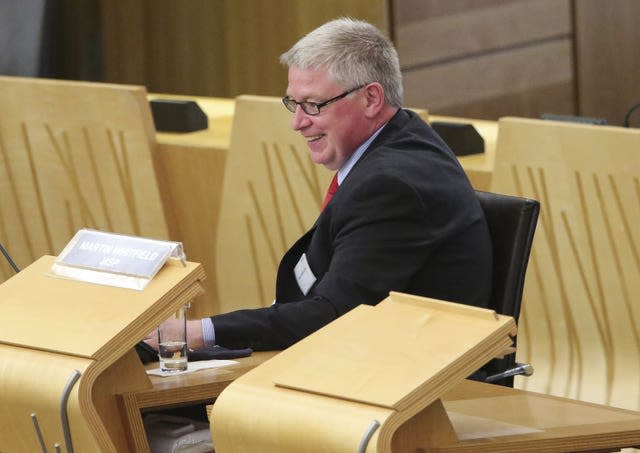Swinney: Standards committee probe into Matheson iPad charges ‘prejudiced’
Scottish First Minister John Swinney has claimed the process that recommended Michael Matheson be barred from Holyrood for 27 days was “prejudiced”.
Holyrood’s Standards, Procedures and Public Appointments Committee said on Thursday a majority of its members backed the suspension, while unanimously agreeing the former health secretary should lose his salary for 54 days, with the sanctions subject to a vote in Parliament.
Mr Matheson now faces pressure to stand down as an MSP and force a by-election as the Scottish Conservatives will hold a vote urging him to resign in Holyrood next week.
Mr Matheson was investigated by the committee after he racked up a near-£11,000 data roaming bill on his parliamentary iPad during a family holiday in Morocco, which he later revealed had been the result of his teenage sons using the device as a wifi hotspot to watch football.
Initially, Mr Matheson had attempted to use a combination of his office costs and expenses to cover the bill, but he later said he would pay it himself after the issue was made public.

During First Minister’s Questions on Thursday, Mr Swinney backed his MSP – describing him as a “friend” who had “made mistakes” – and pointed to comments from Tory MSP Annie Wells, a member of the committee.
“As I consider the findings from the Standards, Procedures and Public Appointments Committee, I have significant concern,” he said.
“I believe this process has been prejudiced.”
Referring to comments made by Ms Wells last year, he added: “Annie Wells said that Michael Matheson’s, and I quote, ‘desperate efforts to justify his outrageous expenses claim have been riddled with lies, cover-ups and the need for us all to suspend our disbelief.’”
Fellow Tory MSP Stephen Kerr announced earlier this year he would resign from the committee because he could not be objective in the Matheson case and he was replaced by Conservative Oliver Mundell.
Mr Swinney said that if a constituent had come to him facing disciplinary action at work when their employer had made similar comments about them, he would “come down on that employer like a tonne of bricks”.

He added: “That is the situation that Michael Matheson if facing here, and that is why I will not be supporting the sanction.”
The First Minister said Falkirk West MSP Mr Matheson has “suffered significant reputational damage and impact on his family as a consequence of losing office and the difficulties that have been created here”, and added he has paid back the roaming costs.
“This Parliament needs to consider seriously the reputational damage that will arise from presiding over an unfair process,” he added.
Scottish Tory leader Douglas Ross accused Mr Matheson of “deceit and abuse of trust” as he revealed his party will seek to push the former minister to resign in a vote next week.
On Mr Swinney’s support for Mr Matheson, the Tory chief added: “That is incredible and indefensible by the First Minister.
“He told us when asking for our support to make him First Minister, he would be First Minister for all of Scotland.
“What Scotland is seeing is he’s a First Minister that backs his pals.”
Such a vote would not be legally binding, and would require every opposition party to vote in favour of the motion for it to pass.

Mr Ross said if the vote is approved, a by-election could be held on July 4 – the same date as the General Election – to allow a new MSP to be voted in.
The Tory leader said the First Minister needs to “consider carefully his reputation and the reputation of this Parliament if he continues down the route he seems to be going”.
Standards committee convener Martin Whitfield earlier revealed its recommendations to Parliament.
He said: “Mr Matheson has set out that since becoming aware of the circumstances in which the data usage occurred, he has been motivated by seeking to protect his family.
“Mr Matheson has described the significant impact that there has been on his family.
“The committee acknowledges the impact of the significant media and other intrusions which took place on Mr Matheson and his family.
“However, the obligations all members have under the code, the expenses scheme and relevant SPCB (Scottish Parliament Corporate Body) policies are of paramount importance in upholding the integrity of the scheme and the ethical standards framework, flowing from the Nolan Principles, that underpin the conduct of parliamentary duties.
“Any failure to meet those obligations has an adverse impact on the reputation of the expenses scheme, members and the Parliament as a whole.”

 Yahoo News
Yahoo News 
